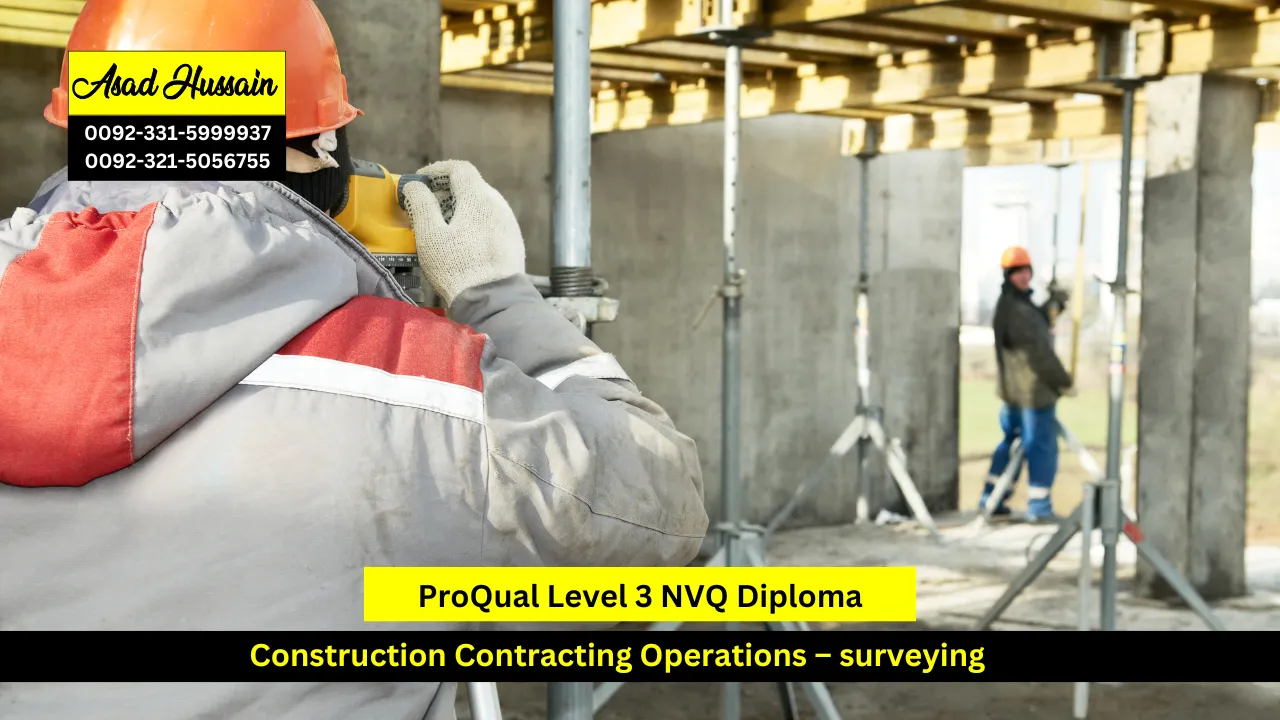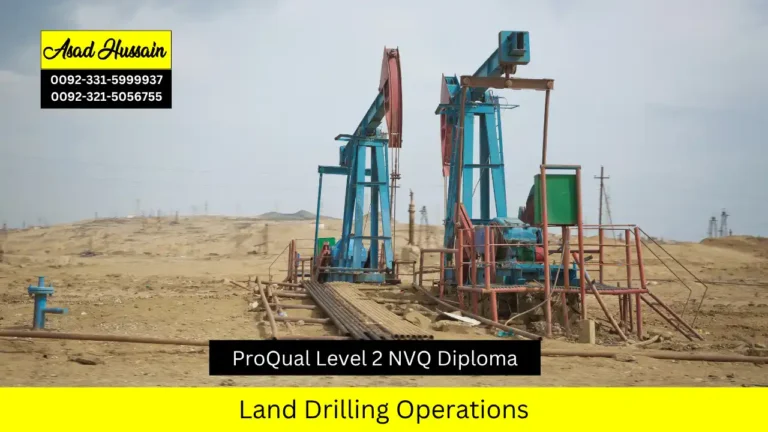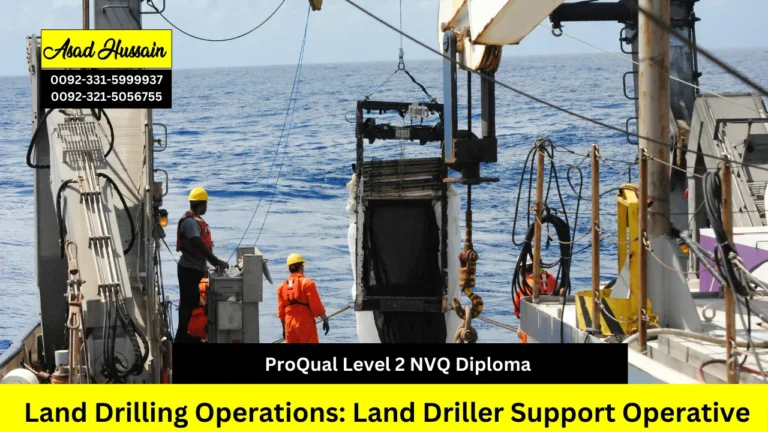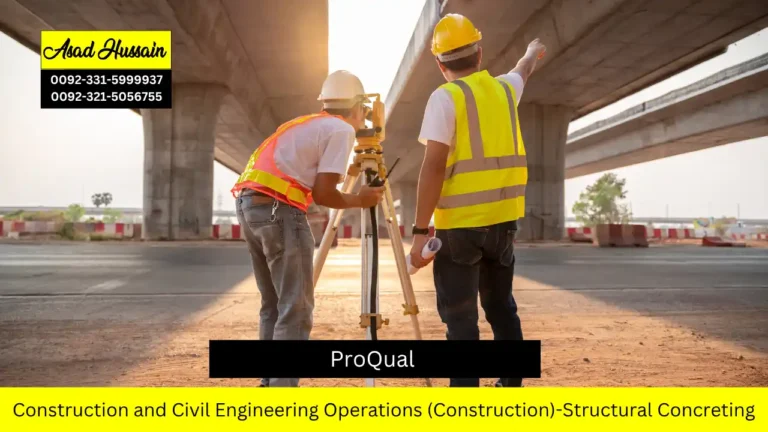The ProQual Level 3 NVQ Diploma in Construction Contracting Operations – Surveying is designed for individuals working within construction environments who are involved in surveying, measurement, and site-based assessment activities. This course focuses on developing practical, work-related skills that reflect real surveying responsibilities on construction projects. Although it is not Ofqual regulated, the qualification is structured around industry-relevant standards and practices. Learners gain a solid understanding of site measurement, data collection, recording information, and supporting project accuracy, enabling them to demonstrate competence through real workplace evidence and practical application.
The programme emphasises hands-on experience and performance-based assessment, allowing learners to build confidence in surveying tasks while remaining in their current roles. It supports the effective use of surveying techniques, equipment awareness, and accurate reporting within construction operations. Learners develop skills in maintaining quality, supporting cost control, and contributing to project efficiency through accurate surveying practices. The course also aligns well with industry-focused certifications and diplomas related to construction surveying, site operations, and technical support, enhancing professional capability without focusing on academic theory alone.
ProQual Level 3 NVQ Diploma in Construction Contracting Operations – Surveying supports professional competence by reinforcing practical surveying skills that are essential to successful construction delivery. The qualification helps learners demonstrate accountability, precision, and consistency in surveying-related tasks while working collaboratively with site teams and management. By complementing existing construction certifications and vocational diplomas, this course strengthens occupational performance and supports workforce standards. Its focus on real-world evidence and operational effectiveness makes it a valuable option for construction professionals aiming to maintain accuracy, efficiency, and reliability within surveying and contracting operations.
Program Highlights
Mandatory Units
- Operate health, safety and welfare systems in construction
- Prepare programmes and schedules of work in construction
- Operate project information systems in construction
- Develop and maintain working relationships and personal development in construction
- Prepare and monitor costs and accounts in construction
Optional Units –
- Prepare for, collect, analyse and present survey data in construction
- Record the condition of property in construction
- Integrate and control project design information in construction
- Prepare for work operations in construction
- Implement contract work in construction
- Establish and maintain the dimensional control of construction works
- Prepare for and carry out physical testing in construction
- Prepare proposals and obtain feedback for the provision of products and services in construction
- Prepare and process invitations to tender in construction
- Prepare estimates, bids and tenders in construction
- Monitor, maintain and improve supplies of materials in construction
- Recommend and monitor supplies of plant and equipment in construction
- Prepare drawings and schedules in construction
- Assess, plan and monitor project methods and progress in construction
Entry Requirements
To ensure learners can effectively complete the ProQual Level 3 NVQ Diploma in Construction Contracting Operations – Surveying, applicants should meet the following entry requirements, which focus on workplace readiness and practical capability:
- Age Requirement: Learners are normally expected to be 18 years of age or above, as the qualification is designed for individuals working in active construction and surveying environments.
- Educational Background: There are no formal academic prerequisites; however, prior learning such as construction-related diplomas, surveying certificates, technical awards, site engineering credentials, or vocational qualifications in construction operations or the built environment can be advantageous.
- Language Proficiency: Learners should have a suitable level of English language proficiency to understand technical instructions, complete workplace documentation, and communicate effectively with site teams and assessors In addition, relevant work experience is essential, as this is a competence-based qualification. Learners should be employed in, or have regular access to, a construction role that involves surveying, measurement, setting-out, or data recording activities to enable the collection of valid workplace evidence.
Learning Outcomes
Operate health, safety and welfare systems in construction
- Understand and apply relevant health, safety, and welfare legislation
- Implement systems to manage health and safety risks on site
- Promote a safe working environment for all personnel
- Monitor and maintain compliance with welfare and safety protocols
Prepare programmes and schedules of work in construction
- Develop structured and logical work programmes using planning tools
- Identify critical activities and dependencies in project timelines
- Allocate resources effectively to meet project objectives
- Monitor and update work schedules to reflect progress and changes
Operate project information systems in construction
- Use digital tools to store, share, and manage project data
- Ensure information accuracy, version control, and secure access
- Facilitate effective communication across teams using IT systems
- Maintain records that support project decision-making
Develop and maintain working relationships and personal development in construction
- Build collaborative relationships with team members and stakeholders
- Apply interpersonal skills in resolving workplace challenges
- Evaluate personal performance to identify development needs
- Plan and pursue opportunities for professional growth
Prepare and monitor costs and accounts in construction
- Create accurate budgets and forecasts for construction projects
- Monitor financial performance against budgets
- Identify and report cost variances promptly
- Maintain financial records in line with contractual and regulatory requirements
Prepare for, collect, analyse and present survey data in construction
- Plan and conduct effective site surveys using appropriate techniques
- Analyse data for accuracy and relevance to construction needs
- Interpret and present findings in clear technical formats
- Support project planning with reliable survey results
Record the condition of property in construction
- Inspect buildings or sites to identify physical condition and defects
- Document findings with photographs and written assessments
- Prepare reports to support maintenance or renovation decisions
- Recommend actions based on condition evaluations
Integrate and control project design information in construction
- Coordinate inputs from design teams to maintain document consistency
- Ensure all team members have access to the latest design data
- Resolve discrepancies in design information effectively
- Support seamless integration between design and site execution
Prepare for work operations in construction
- Identify operational requirements for site activities
- Plan and allocate resources including labour, equipment, and materials
- Communicate preparation plans clearly to the project team
- Monitor readiness and address issues before work begins
Implement contract work in construction
- Understand and apply contract terms during construction activities
- Coordinate site work to meet contractual obligations
- Monitor compliance with contract specifications and deliverables
- Handle variations or disputes in line with legal and procedural standards
Establish and maintain the dimensional control of construction works
- Set out construction elements with precision and accuracy
- Use surveying tools to measure and verify dimensions
- Adjust work based on measurements and tolerances
- Maintain dimensional records to support quality assurance
Prepare for and carry out physical testing in construction
- Identify appropriate tests for materials or structures
- Conduct tests safely and according to standards
- Record and evaluate test results accurately
- Use test outcomes to inform construction quality and compliance
Prepare proposals and obtain feedback for the provision of products and services in construction
- Develop detailed and client-focused proposals
- Engage stakeholders for input and validation
- Revise proposals based on feedback and project goals
- Present final proposals in a professional and persuasive manner
Prepare and process invitations to tender in construction
- Draft clear and complete tender documents
- Organise and manage the tendering process
- Evaluate bids according to pre-defined criteria
- Ensure transparency and compliance throughout the process
Prepare estimates, bids and tenders in construction
- Calculate accurate cost estimates based on scope and resources
- Develop competitive and structured tender submissions
- Align bids with client expectations and market standards
- Manage documentation and submission deadlines effectively
Monitor, maintain and improve supplies of materials in construction
- Track material usage and stock levels on site
- Coordinate supply chains to ensure timely deliveries
- Identify waste or inefficiencies in material handling
- Recommend strategies to optimise material flow and reduce cost
Recommend and monitor supplies of plant and equipment in construction
- Determine plant and equipment needs based on project requirements
- Assess supplier options and recommend appropriate selections
- Monitor equipment usage and availability
- Maintain equipment records and ensure compliance with safety standards
Prepare drawings and schedules in construction
- Create detailed technical drawings using design software
- Develop schedules that align with project phases and deliverables
- Coordinate drawings with specifications and work plans
- Ensure technical accuracy and clarity in visual documentation
Assess, plan and monitor project methods and progress in construction
- Evaluate construction methods for effectiveness and compliance
- Develop project-specific plans and implementation strategies
- Track project milestones and performance indicators
- Adjust plans as needed to meet objectives and deadlines
Target Audience
This course is designed for individuals who are actively involved in surveying and measurement activities within construction projects and who want to formally demonstrate their practical competence in a real working environment. It is ideal for professionals seeking to strengthen accuracy, reliability, and technical awareness in construction contracting operations.
- Site surveyors supporting measurement, setting-out, and data collection tasks
- Assistant surveyors working under senior technical or project staff
- Construction operatives involved in surveying, levelling, or measurement duties
- Site engineers and technical assistants contributing to surveying activities
- Project support staff responsible for recording and verifying site data
- Experienced construction workers progressing into surveying-focused roles
Overall, this qualification supports practical skill recognition and workplace performance, making it well suited for professionals aiming to enhance operational accuracy and surveying capability through the ProQual Level 3 NVQ Diploma in Construction Contracting Operations – Surveying.







